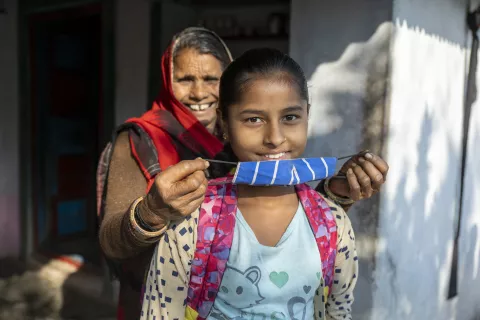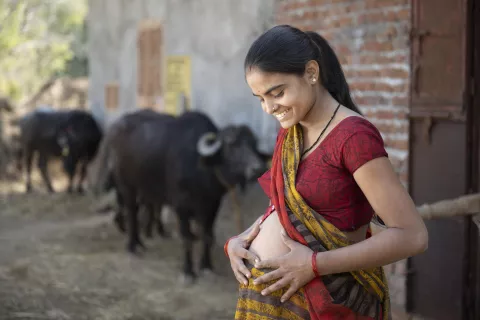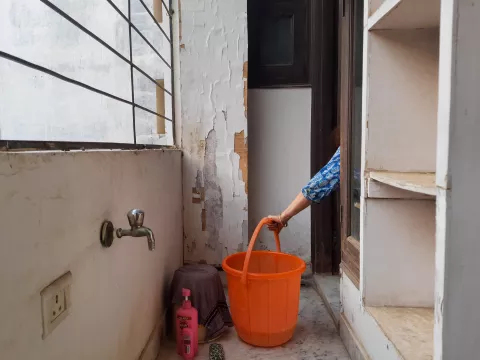Children and COVID-19 vaccines — Parents’ Questions Answered
UNICEF experts answer questions from parents on COVID-19 vaccination for children

Vaccines have been a game changer in the fight to end the pandemic and COVID-19 vaccines have been available for many children in South Asia for several months.
Even though children’s risk of getting severely ill from COVID-19 is very low, COVID-19 vaccines lower this risk even more and may help protect children from developing long COVID. Vaccinating children also helps stop the virus spreading, protects other people and keeps children in school, protecting their well-being.
We sat down with UNICEF South Asia Health Experts to answer parents’ top questions and concerns, to help you confidently keep your child safe.
1. “Can children get the COVID-19 vaccine?”
The World Health Organization (WHO) recommends that children can receive COVID-19 vaccination once those more at risk have been fully vaccinated.
In South Asia, as of 26 January 2023:
-
Afghanistan has not yet started vaccinating children against COVID-19.
-
In Bangladesh, COVID-19 vaccines are available for children aged 5 and older.
-
In Bhutan, COVID-19 vaccines have been made available for all children aged 5 and older.
-
In India, COVID-19 vaccines are available for children aged 12 and older.
-
In Maldives, COVID-19 vaccines are available for children aged 12 and older. There are plans to make vaccination available for children ages 5-11 in the coming months.
-
In Nepal, COVID-19 vaccines are available for children aged 5 and older.
-
In Pakistan, COVID-19 vaccines are available for children aged 12 and older. Vaccines for children ages 5-11 are currently being rolled out in some provinces, with plans to expand to the rest in the coming months.
-
In Sri Lanka, COVID-19 vaccines are available for children aged 12 and older.

2. “Are COVID-19 vaccines safe for children?”
Yes.
Medical experts advising The World Health Organization have undertaken a thorough review and found that COVID-19 vaccination of children with approved vaccines is safe and effective.
WHO has approved the Pfizer and Moderna vaccines for children aged 6 months and older and the COVOVAX vaccine for children aged 12 and older.
Many countries in South Asia have approved other COVID-19 vaccines for children, after examining safety and efficacy data for these vaccines.
COVID-19 vaccine doses for children aged 5-11 are made up of smaller amounts of the vaccine, sometimes called ‘paediatric vaccines’. Vaccines doses for children under the age of 5 are even smaller.
Children aged 12 and over receive the same vaccine dose as adults.
You can learn more about your country’s guidelines by speaking to a healthcare worker or visiting the Ministry of Health’s website.
3. “COVID-19 symptoms are usually mild among children. Why should my child get the COVID-19 vaccine?”
Fortunately, children have a low risk of getting severely ill from COVID-19. Many of them recover from the virus without showing any symptoms at all.
However, very low numbers of children have developed severe disease, needed treatment in an intensive care unit and some have died from the virus. This is relatively rare. But it does happen.
Children with underlying health conditions (including obesity, heart, kidney or liver disease, asthma, cystic fibrosis and cancer) are at higher risk of developing severe disease from COVID-19.
Children are also at risk of developing ‘long COVID’. Long COVID involves long-lasting symptoms of the virus for weeks, or sometimes months. These symptoms can include fatigue and headaches.
Getting your child vaccinated against COVID-19 reduces their risk of getting sick from COVID-19 and could reduce their risk of developing long COVID too. This helps to reduce the chance of disruption from COVID-19 to their education and other activities they enjoy.
There have also been reports of a link between COVID-19 and Multisystem inflammatory syndrome in children (MIS-C). MIS-C is a very rare condition, that can happen several weeks after a COVID-19 infection, where different parts of the body can become inflamed, including the heart, lungs, kidneys, brain, skin, eyes, or gastrointestinal organs. This can lead to multiorgan failure, shock and in very rare cases, death.
MIS-C can happen even if a child has mild or no symptoms of COVID-19. It’s not yet understood why some children get this rare condition. But the latest research also shows that COVID-19 vaccination helps protect children from developing MIS-C too.
More information on MIS-C can be found here.
If you have any concerns or questions, speak to your local health worker.

4. “How many COVID-19 vaccine doses are recommended for children?”
Just like adults, children need two doses of COVID-19 vaccine. They are fully vaccinated two weeks after they’ve had their second dose.
Children should get their second dose at least 3 or 4 weeks after their first dose.
Boosters
WHO recommends that people at a high risk from COVID-19 are prioritized for booster doses. This can include children with certain health conditions.
In South Asia, some countries that have made good progress in vaccinating high-risk groups are now offering boosters to lower risk groups, including children over the age of 12.
New boosters that are being rolled out have been developed to provide protection against the original strains of COVID-19 and Omicron variants.
Guidance from WHO on the need for, and timing of, booster doses for children ages 5-11 years old is expected soon.

5. “Are there any side effects of COVID-19 vaccination for children?”
Like all medicines, COVID-19 vaccines can cause side effects.
Millions of children around the world have been vaccinated against COVID-19 so far — and serious side effects have been very rare. The few side effects that have been reported have been mild. Children might get a slight fever, headache, body-aches or soreness in their arm from the injection, similar to the symptoms they might experience from their routine childhood vaccines. Some children experience no side effects at all.
These are normal reactions that should get better on their own within a few days. If symptoms continue, visit your local health facility and talk to a health worker for advice to relieve these symptoms.
6. “My child had COVID-19 and recovered. Do they still need to get vaccinated?”
Yes. Getting vaccinated after a COVID-19 infection is safe and recommended by experts.
Even if your child has recovered from COVID-19, they can still get it again. Getting vaccinated adds an extra layer of protection to any natural immunity your child might have developed against the virus. The risk of children getting severely sick from COVID-19 is thankfully very low — but vaccines help lower this risk even more.
If your child has recently had COVID-19, speak to your local health worker about when they recommend your child to have their first or next dose.
7. “COVID-19 vaccines are not yet available for my child. How can I keep them safe?”
If your child is not old enough to get vaccinated, or vaccines aren’t yet available to them in your country, here are simple ways you can help keep your child safe:
-
Continue wearing a well-fitted mask, particularly when indoors or in large group settings. Children aged 6 and older are encouraged to wear a mask in these settings. Here are some tips on masks for young children.
-
Stay outdoors and in well-ventilated places as much as possible when visiting friends or family.
-
Encourage your child to practice safety precautions. This includes frequent handwashing, particularly at school and when playing with friends. You can also show your child how to limit the spread of COVID-19 by covering a cough or sneeze with their elbow.
-
Get vaccinated yourself. By getting fully vaccinated you are not only protecting yourself from getting severely sick, but you are also reducing the risk of spreading it to your child.
As the virus continues to evolve and new variants emerge, we know that vaccines alone cannot stop infections from happening. That’s why it’s important to get fully vaccinated and continue practicing personal preventative measures. Let’s all continue to do our part.
8. “My child is not yet vaccinated against COVID-19, is it safe to send them to school?”
Yes.
Your child’s school attendance should not depend on whether they are vaccinated against COVID-19.
Schools can open safely without requiring every child to be vaccinated against COVID-19.
Instead, sensible safety precautions, like access to soap and clean water, masks, regular handwashing, physical distancing, and the sanitization of surfaces, can make schools a safe environment for children.
There is currently no scientific evidence to suggest that schools are a main driver of community transmission. But we do know that being out of school takes an enormous toll on children’s physical and mental health.
For our experts it’s clear — the risks of being out of school are greater than the risks of being in school.
9. “Can my child get their routine vaccinations at the same time as their COVID-19 vaccination?”
Yes, it is safe for your child to get other vaccines at the same time as their COVID-19 vaccine. In fact, it is common for young children to receive multiple routine vaccines during the same health visit.
It’s important to stick to your child’s routine vaccination schedule and make sure they stay up to date with all their childhood vaccines.
UNICEF experts answer parents’ questions on childhood vaccinations.
This article was last updated on 1 Feb 2023. It will continue to be updated to reflect the latest information.




